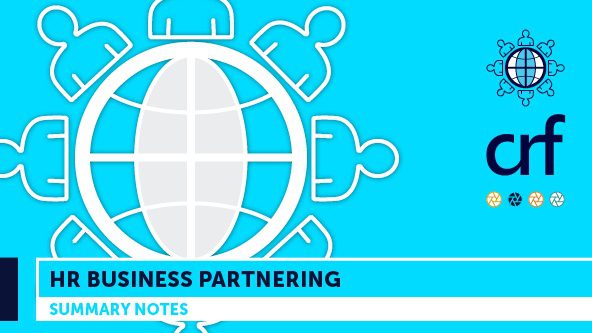Business Partnering
The Role of the Effective HRBP in Culture Change
On February 8th CRF hosted an online discussion for senior members of the HR Business Partner (HRBP) community. Chaired by Emma Lucas, Founder at Think Coaching Ltd, the session included a culture change case study shared by Geoff Lloyd, former CHRO at FTSE 100 organisation Meggitt, as well as an opportunity for community members to share their related experiences and expertise. Discussion topics included the success and challenges in delivering culture change, the role the HRBP should play in culture change, and how to effectively measure change. This summary shares key insights from the discussion.
Case Study: Culture Change at Meggitt
Geoff Lloyd, former CHRO at Meggitt, outlined how the organisation had faced a need to transform through dividing the company into its constituent parts and providing more value to shareholders. As part of this transformation, the organisation appointed a new CEO and focused on generating more value through stronger collaboration and innovation. This was a process of culture change and included the following steps:
- Align people around a common vision with an emotional hook, which should apply on three levels – what does the change mean for the individual, the team and the organisation? Once the core narrative is right, it can be repeated across the organisation.
- Create a common language that resonates and supports the team to better deliver their goals. Meggitt created 22 simple yet powerful concepts such as ‘the shadow of the leader’ (i.e. the influence cast by a leader) or ‘be here now’ (i.e. be present in the room with people and focus on the topic). Different concepts will matter to different people.
- Create a strong programme structure, with an allocated budget and Programme Manager.
- Identity facilitators from a range of organisational departments and levels. Meggitt supported these facilitators through a one-week training programme and coaching, beginning by discussing a definition of culture. Successfully identifying facilitators involves finding those who have a voice in the organisation and who are willing to use it to further your aim.
- Focus on small, bite-sized changes that resonate and avoid people being overwhelmed.
- Embed the culture into everything you do. At Meggitt, this included working closely with the Head of Communications (e.g. referring to the concepts in newsletters), re-designing organisational awards and ensuring the CEO was an advocate. Interweaving the language in all parts of the organisation (reward, performance management etc.) was also important.
- Culture change should be fully collaborative, with bottom-up messaging on the benefits and top-down understanding and sharing of the strategic imperative.
Geoff Lloyd also outlined challenges (and how these can be overcome) and lessons learned form the culture change process:
- Recognise that there will be lulls in employee engagement. This is an inevitable part of the process and it’s important to continue with the project to ensure any changes aren’t lost (e.g. Meggitt decided not to suspend activities during virtual working in the Covid-19 pandemic to avoid losing momentum).
- Culture change is also about highlighting what people are doing well, rather than just focusing on what can be improved.
- Don’t be over-dependent on top-down change – aim to get everyone involved as quickly as possible and create alliances across the business.
- Don’t be afraid to call out senior people who are not fully committed to the change.
Geoff Lloyd also outlined ways HRBPs can enable this culture change:
- Culture can be defined as ‘the way things are done round here (when no one is looking)’. Using this definition, HRBPs have a critical role to play through their on-the-ground knowledge of what is really happening in the organisation.
- Sharing success stories is one of the most powerful ways of embedding culture change. HRBPs can help through capturing and telling stories and focusing on success stories and the moments that people are talking about.
- Facilitation is a core skill for HRBPs, and can also be used to support culture change.
Members also shared their own experiences and lessons learned from implementing culture change:
- One participant shared the importance of having key stakeholders cascaded throughout the organisation to create buy-in during large change programmes.
- Another shared that they had found people were uncomfortable with the terminology of culture change. Instead, they presented it as an evolution and are focused on what areas of culture they want to accentuate or dial down.
Measuring Culture Change
Geoff Lloyd outlined that culture change is about stories, which are inherently hard to measure. Ideally, each story should be linked to an outcome credibly related to the business case. Participants also shared the following regarding measuring culture change:
- One participant noted that, in their experience, it was key to use evidenced metrics to demonstrate the benefits of cultural change throughout the journey. These should be transparent and include challenges as well as successes to build trust across the business.
- Using a range of different types of measures is helpful, including employee engagement surveys and less formal measures.
- Whilst metrics are important, the human factor will always be involved in culture change (which is difficult to plan for).
Further Resources
CRF. 2022. Applying Social Science to Behavioural Change
CRF. 2022. The Measurement of Culture and Culture Change
ONLINE EVENT
A Systems Thinking Approach to Organisational Change
20 February, 15.00 – 16.00 GMT / 16.00 – 17.00 CET
The next HRBP community event will take place on May 8th, with the topic to be shared in due course.
If you have any further questions, please contact Melissa Bull, Commercial Director melissa@crforum.co.uk
MEMBER LOGIN TO ACCESS ALL CRF CONTENT




